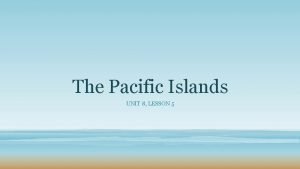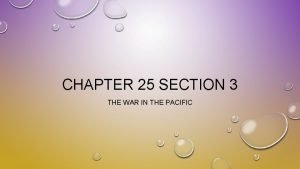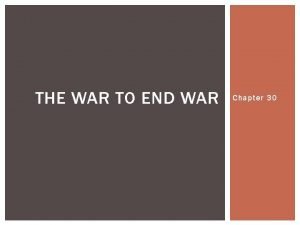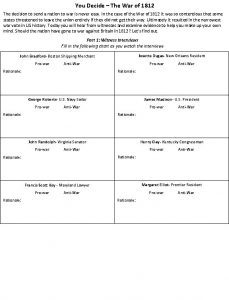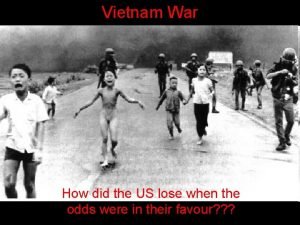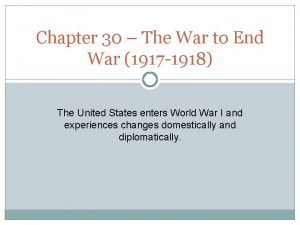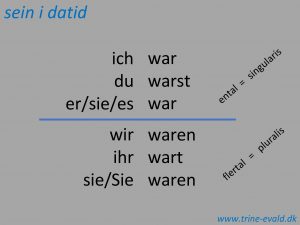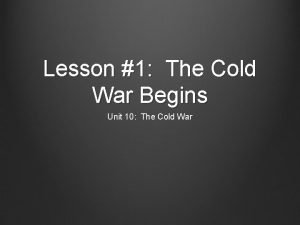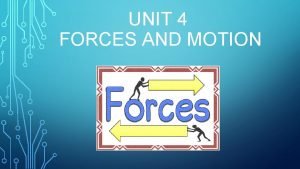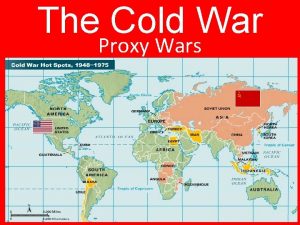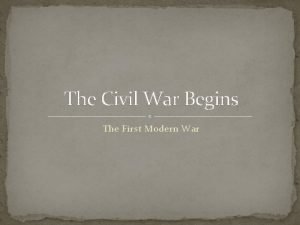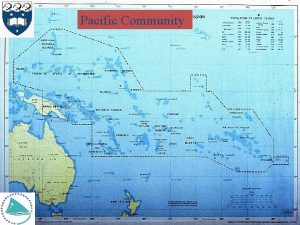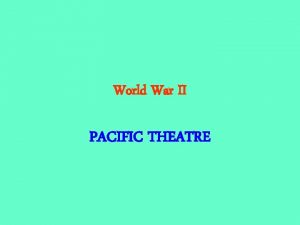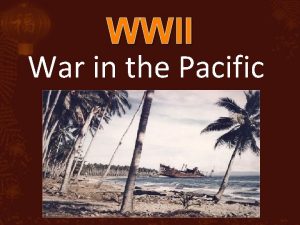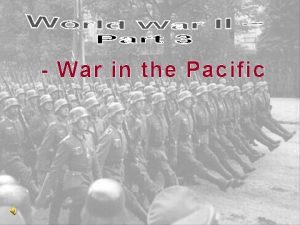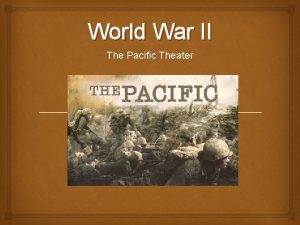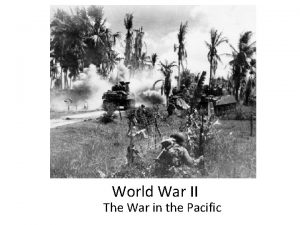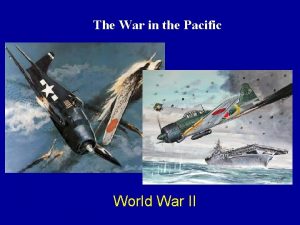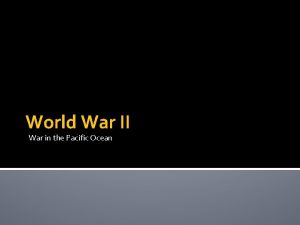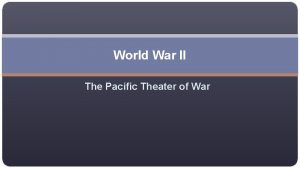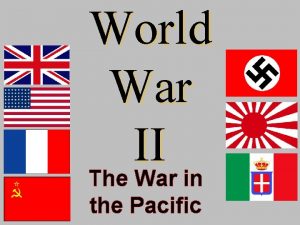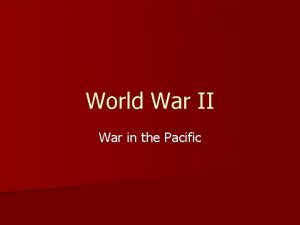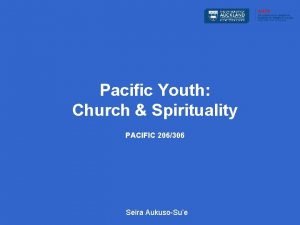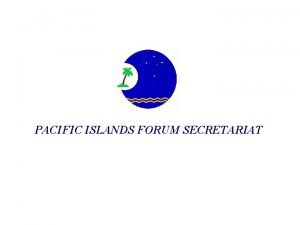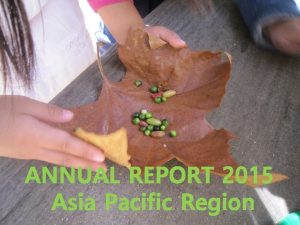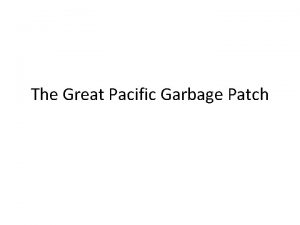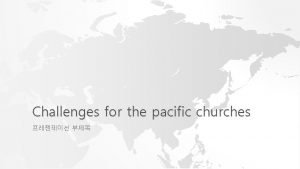War in the Pacific War in the Pacific







![Singapore Surrenders [February, 1942] Singapore Surrenders [February, 1942]](https://slidetodoc.com/presentation_image_h/16b275581369758ca790234c2ccf5f73/image-8.jpg)
![U. S. Surrenders at Corregidor, the Philippines [March, 1942] U. S. Surrenders at Corregidor, the Philippines [March, 1942]](https://slidetodoc.com/presentation_image_h/16b275581369758ca790234c2ccf5f73/image-9.jpg)







![US Marines on Mt. Surbachi, Iwo Jima [Feb. 19, 1945] US Marines on Mt. Surbachi, Iwo Jima [Feb. 19, 1945]](https://slidetodoc.com/presentation_image_h/16b275581369758ca790234c2ccf5f73/image-17.jpg)







- Slides: 24

War in the Pacific

War in the Pacific Remember the invasion of Manchuria (1931) and China (1937)? Japanese foreign policy objectives • Access to raw materials • Win new foreign markets • Gain an outlet for surplus population

War in the Pacific Remember the invasion of Manchuria (1931) and China (1937)? Japanese foreign policy objectives • Access to raw materials • Win new foreign markets • Gain an outlet for surplus population

War in the Pacific Japan foreign policy brought the country into conflict with the United States 1937: Japanese invasion of China Ø 1939: United States imposed economic sanctions on Japan § Japanese industries depended on American petroleum, steel, iron and industrial machinery 1940: Japan occupied part of Indochina (Vietnam) Ø United States moved the Pacific Fleet to Pearl Harbor, Hawaii 1941: U. S. imposed sanctions on aviation fuel, iron and scrap metal § § Japan announces the Greater East Asia Co-Prosperity Sphere which called for Japanese control of all resources in Southeast Asia Roosevelt froze all Japanese assets in the U. S. and ended all trade between the two countries

War in the Pacific Japan lacked the resources to continue the war in China. Ø Japanese leaders faced the choice: to negotiate or fight and seize resource rich territories in Southeast Asia.

Pearl Harbor - Dec. 7, 1941 A date which will live in infamy!

Pacific Theater of Operations
![Singapore Surrenders February 1942 Singapore Surrenders [February, 1942]](https://slidetodoc.com/presentation_image_h/16b275581369758ca790234c2ccf5f73/image-8.jpg)
Singapore Surrenders [February, 1942]
![U S Surrenders at Corregidor the Philippines March 1942 U. S. Surrenders at Corregidor, the Philippines [March, 1942]](https://slidetodoc.com/presentation_image_h/16b275581369758ca790234c2ccf5f73/image-9.jpg)
U. S. Surrenders at Corregidor, the Philippines [March, 1942]

Axis Powers in 1942 Height of Control

Japanese strategy Admiral Isoroku Yamamoto "I can run wild for six months … after that, I have no expectation of success"

Farthest Extent of Japanese Conquests

Battle of Midway Island: June 4 -6, 1942

Allied Counter-Offensive: “Island-Hopping”

War in the Pacific Japanese strategy fundamentally flawed Ø Technological and industrial capacity of the United States

Lt. Col. Jimmy Doolittle: First U. S. Raids on Tokyo, 1942
![US Marines on Mt Surbachi Iwo Jima Feb 19 1945 US Marines on Mt. Surbachi, Iwo Jima [Feb. 19, 1945]](https://slidetodoc.com/presentation_image_h/16b275581369758ca790234c2ccf5f73/image-17.jpg)
US Marines on Mt. Surbachi, Iwo Jima [Feb. 19, 1945]

Dropping of Atomic Bomb • Question: Was the U. S. justified in using the A-Bomb?

Tinian Island, 1945 Little Boy Fat Man Enola Gay Crew

Hiroshima – August 6, 1945 © 70, 000 killed immediately. © 48, 000 buildings. destroyed. © 100, 000 s died of radiation poisoning & cancer later.

The Beginning of the Atomic Age

Nagasaki – August 9, 1945 © 40, 000 killed immediately. © 60, 000 injured. © 100, 000 s died of radiation poisoning & cancer later.

Japanese A-Bomb Survivors

Hiroshima Memorials
 Unit 8 lesson 5
Unit 8 lesson 5 Chapter 25 section 3 the war in the pacific
Chapter 25 section 3 the war in the pacific War at home and abroad madison
War at home and abroad madison Chapter 30 the war to end war
Chapter 30 the war to end war Josette dugas war of 1812
Josette dugas war of 1812 Bringen simple past
Bringen simple past Description
Description Chapter 30 the war to end war
Chapter 30 the war to end war Sein remse
Sein remse Toward civil war lesson 3 secession and war
Toward civil war lesson 3 secession and war Welcome 1 unit 10 lesson 1
Welcome 1 unit 10 lesson 1 Tug of war or tug-of-war
Tug of war or tug-of-war Sides of the cold war
Sides of the cold war Reconstruction plans venn diagram
Reconstruction plans venn diagram Why was the civil war considered the first modern war
Why was the civil war considered the first modern war Chúa yêu trần thế alleluia
Chúa yêu trần thế alleluia Hổ sinh sản vào mùa nào
Hổ sinh sản vào mùa nào Diễn thế sinh thái là
Diễn thế sinh thái là đại từ thay thế
đại từ thay thế Vẽ hình chiếu vuông góc của vật thể sau
Vẽ hình chiếu vuông góc của vật thể sau Công thức tính độ biến thiên đông lượng
Công thức tính độ biến thiên đông lượng Tỉ lệ cơ thể trẻ em
Tỉ lệ cơ thể trẻ em Thế nào là mạng điện lắp đặt kiểu nổi
Thế nào là mạng điện lắp đặt kiểu nổi Lời thề hippocrates
Lời thề hippocrates Vẽ hình chiếu đứng bằng cạnh của vật thể
Vẽ hình chiếu đứng bằng cạnh của vật thể
